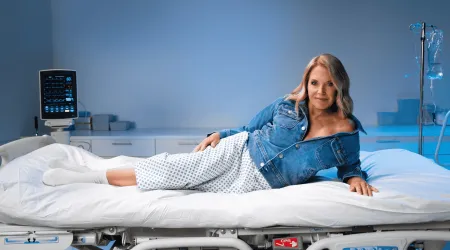
Genetics and inherited conditions
About 5-7% of colorectal cancer patients inherited a gene mutation that greatly increased their lifetime risk.


Genetics and your risk
What if you had a crystal ball that told whether you and your family are more likely to face colorectal cancer?
Unfortunately, we don’t have a crystal ball — or its medical equivalent — quite yet, but knowing about your family history and any hereditary genetic conditions can help you stay ahead of the game.
Cancer & genetics

Genetic conditions associated with colorectal cancer
The most common types of hereditary colorectal cancer are:
- Lynch syndrome
- Muir-Torre syndrome (MTS)
- MUTYH-associated polyposis syndrome (MAP syndrome)
- Familial adenomatous polyposis (FAP)
- Peutz-Jeghers syndrome
- Li-Fraumeni Syndrome
How do I know if I’m at risk?
There are three subgroups of risk for cancer.
Sporadic risk
If you fall into the sporadic group, which means you have no family history of cancer or inherited genetic predisposition, you have about a one in 24 chance of getting colorectal cancer.
Familial risk
If you have familial risk, meaning an immediate family member has the disease, your lifetime risk increases to 10 to 20 percent.
Hereditary risk
Those who have the highest lifetime risk of colorectal cancer are in the hereditary subgroup. Depending on the particular genetic syndrome, the chances of getting colorectal cancer may be 30 to 100 percent.

What can I do after I know my genetic risk?
Screening is the most important thing you can do to prevent colorectal cancer because it finds cancer in the early stages. Talk to your healthcare provider about your personal genetic risks.
Talk to your family
Exploring your family health historyTop resources

National Cancer Prevention Month: Majority View Encouraging Screening as an Act of Love
Americans increasingly view colorectal cancer screening encouragement as an act of love, with new survey data showing rising openness about lifesaving prevention.

"Clinical trials gave us time": A daughter’s tribute to her mother’s courage
When Kate Shin’s mother faced rectal cancer, clinical trials gave them precious time together. Now, Kate shares her story to encourage access to screening and innovative care, including clinical trials.

Katie Couric Joins the Colorectal Cancer Alliance To ‘LEAD FROM BEHIND’
Katie Couric joins the Colorectal Cancer Alliance and Ryan Reynolds’ Maximum Effort to expand LEAD FROM BEHIND, a star-powered campaign breaking stigma and urging lifesaving colon cancer screening. Colon cancer is the preventable cancer.





